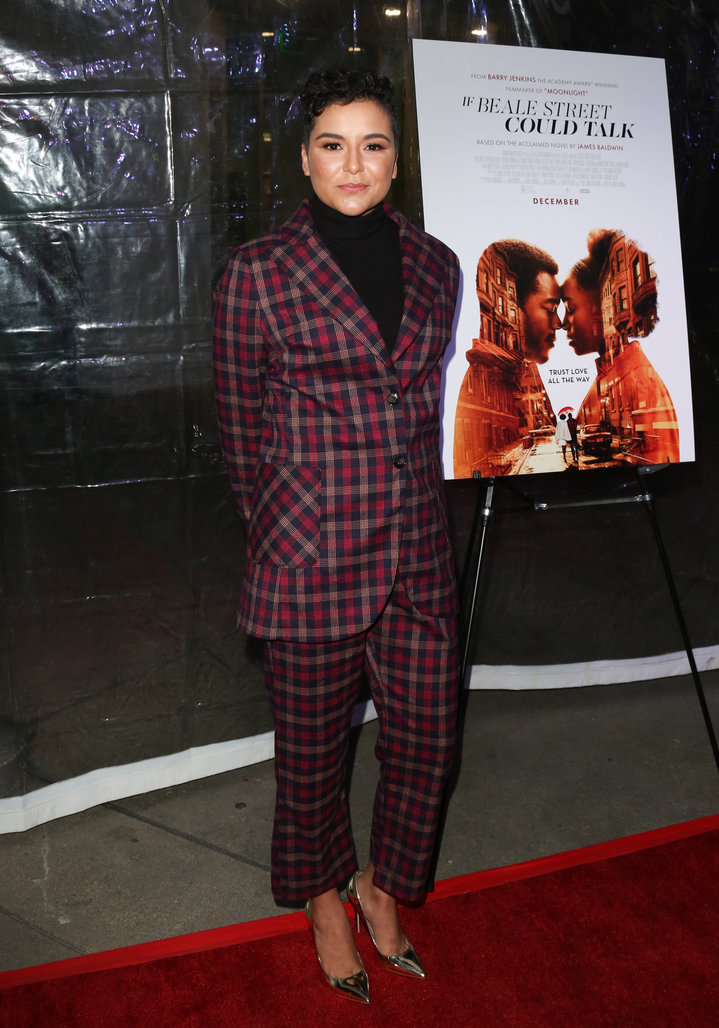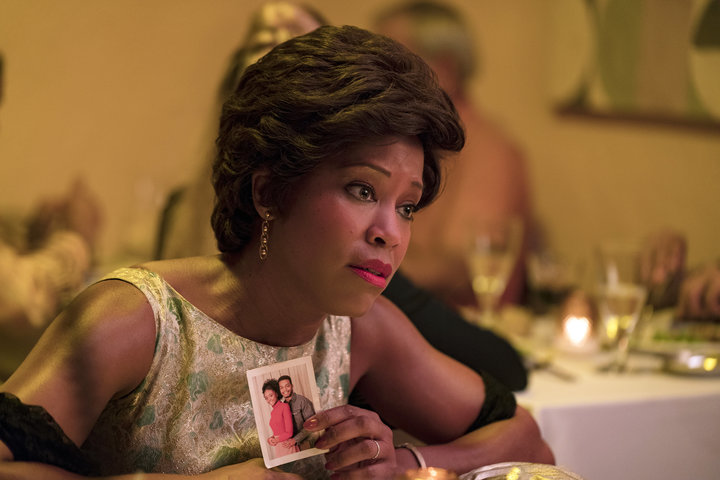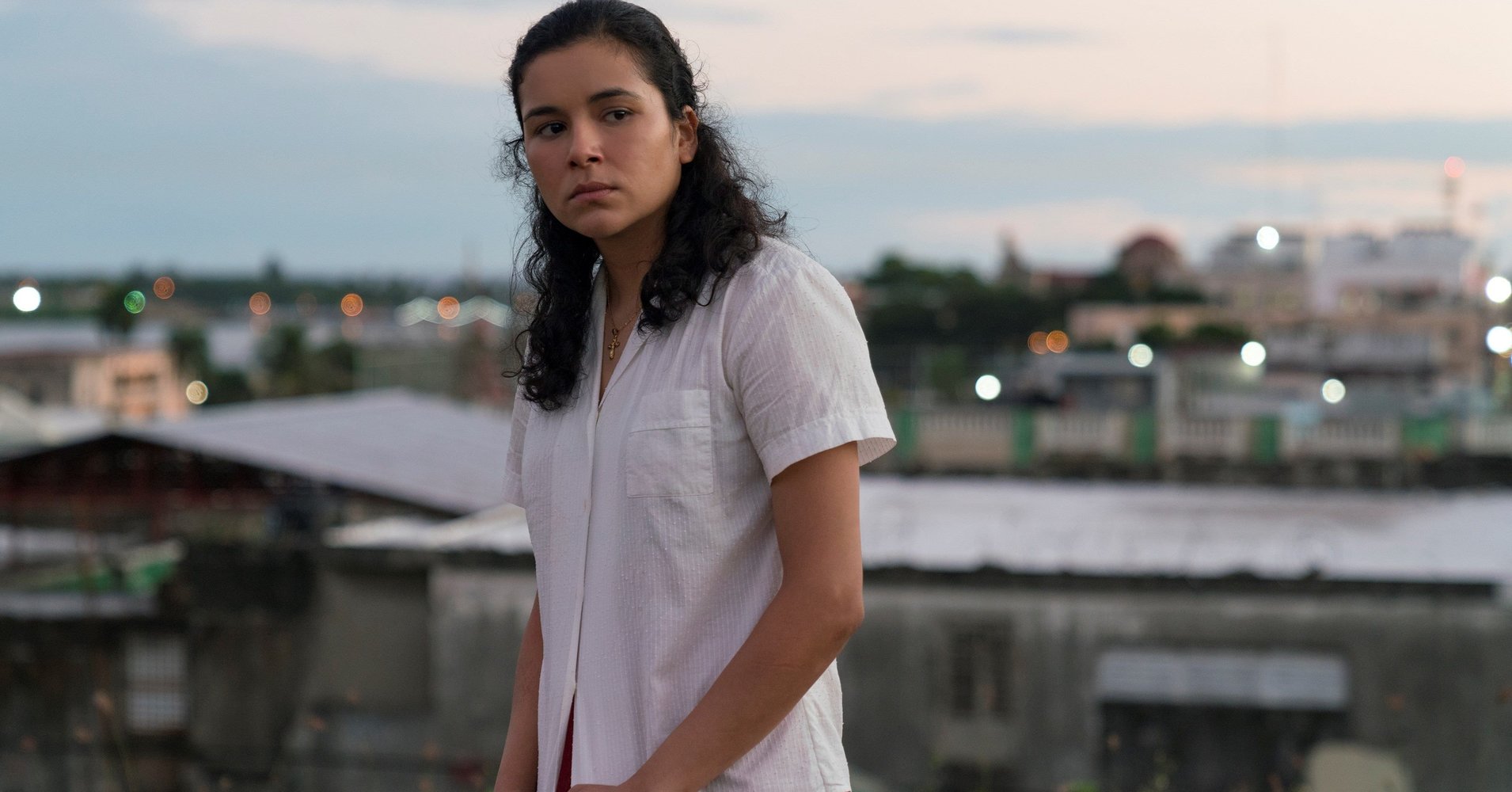[ad_1]
It’s been a surprising, frustrating awards season. Certain movies and performances have risen to the top of the Oscar hopeful pile that nobody saw coming (or wanted to), while others have simply fallen by the wayside, no matter how good. As the run-up to the 2019 Academy Awards, fraught as it is with controversy, comes to a close, my mind keeps going back to the performances that aren’t getting recognized on the stage this Sunday at all. Like Toni Collette’s hauntingly over-the-top presence in “Hereditary. Or Michelle Yeoh’s cool and understated turn as a not-impressed mother-in-law in “Crazy Rich Asians.”
And then there’s a performance even fewer people have talked about this awards season, that was too brief to ever be an Oscar contender: Emily Rios as Victoria Rogers in “If Beale Street Could Talk.” Rios is on screen for just a handful of minutes, but she’s somehow essential to the film. We see her first in abstract, portrait-like flashes during the middle of the film and later in one integral scene in which she goes toe-to-toe in an acting master class with Regina King (who is nominated in the Actress In A Supporting Role category).
Rios, as Rogers, plays a rape victim who falsely accuses Fonny, the movie’s male lead, as her assaulter, landing him in prison and forcing his lover, Tish, and her family to fight for his freedom. In the climax of the film, Tish’s mother (played by King) travels to Puerto Rico in order to find Victoria and convince her to withdraw her accusation.
Rios, with just a few lines, manages to convey the aftermath of trauma ― the gravity of her delivery in her eyes, the way she tilts her head or brings a cigarette shakily to her lips. At one point, she sneers, looks King’s character straight in her eyes and says, “One thing I can tell, lady, you ain’t never been raped.” The scene ends with Rios letting out a raw, guttural scream when King’s character attempts to touch her ― a scream that conveys the pain and injustice that every character in the film must suffer. It’s brilliant.
A few weeks ago, I spoke with 29-year-old Rios, a California native and star of FX’s “Snowfall,” about her performance in “Beale Street,” what it was like to work with a veteran like King, how their scene came together, and how she worked through her own personal Me Too trauma by playing Victoria.

I think yours is one of the most powerful and underrated performances of the year. And I guess I just want to kind of get a sense of your process, what the experience was like and what you took away from it. How did you get to this role?
I got a direct offer actually, for the role, so I didn’t have to audition. I’ve only gotten a few opportunities like that in my life. And to have that be “Beale Street” is obviously a huge honor. I would have given my right arm to be an extra in the movie, so [it was] such an opportunity and such a great gig. It was a blessing.
How did you feel embarking on the character of Victoria Rogers?
Embarking on the character, I mean, I read the book obviously. And there are no small characters. I thought Victoria Rogers was one of the least of those. They talk about her throughout the entire film and you see her a little bit, and I think it’s right after Tish and Fonny have their first love scene and you get a glimpse of her and you get to see her, but you don’t really … she kind of is almost like a villain throughout the film, until you meet her and then you realize that she’s also a victim herself. Which all of the characters are in this film mostly.
It’s hard to play characters like this and bring that [balance] to light. But, I’ve been getting a lot of great feedback. So I’m just hoping that I was able to bring justice to this character because you can see it from so many different angles. But if I brought her justice, it’s through making the audience see that she’s also a victim, and although she’s put in an unfortunate circumstance to pin somebody else for … wrongly accusing somebody of raping her, I mean, she clearly experienced the trauma and it’s just hard to relive and to talk about it again. She’s having a really hard time, obviously in Puerto Rico where you see the scene. She hasn’t recouped.
When the film was being made, Me Too hadn’t yet reached the point where it is now, where we’re all talking about the ramifications of sexual assault. Did you do any research into the lives of sexual assault victims, the psychological toll it takes? Did you look into that at all or did you just kind of go into it with instinct?
No, actually, I thought it was a great opportunity to bring that into the light. As a matter of fact, like you said, [Me Too conversations] hadn’t reached what they are currently at the moment, so I looked into a lot of trauma victims who have survived sexual assault. And to me it’s … I forget the statistic, what number of women have actually been raped, but I think 100 percent of women have been sexually [harassed]. They have experienced some kind of attack, they have felt unsafe, they have felt like they were being harassed. 100 percent. I think 100 percent of women have dealt with this. [Editor’s Note: According to the National Sexual Violence Resource Center, 1 in 5 women will be raped at some point in their lives, and 1 in 3 women will experience some form of contact sexual violence in their lifetime.]
When I went to the [“Beale Street”] premiere at the Apollo Theater in New York, I couldn’t watch the scene because, to me, once I filmed it through my own traumas, I was able to release so much at the end of the filming in the Dominican Republic and I let go of so much. That quick little glimpse that you get of Victoria Rogers right after Tish and Fonny have their love scene, and you just get a glimpse of her, it was something that was unscripted and it wasn’t planned. We were already done filming and Barry Jenkins said that he saw something in me that was lifted and so he wanted the audience to be able to see that. And so, you know, he just had me look directly into the camera and the camera pans and I didn’t move. He just had this whole idea of how he was going to introduce Victoria Rogers to the audience.
And it was right after filming the scene as a matter of fact, but I went through my own struggles and you know, with the Me Too movement as well and knowing that I’ve dealt with certain things like that. I looked into a lot of women and what their experience was with that. I used a lot of different kinds of research just to see how different women react to the same sort of struggle that they’re dealing with.
There was a lot of different ways to go about it. But I thought the way I played it was somebody who still hasn’t come back to their body. Someone who still hasn’t come back to the realization that they are no longer in harm’s way, that they’re in a safe place, that anything that’s like some kind of connection isn’t necessarily meant to be some aggravated assault or something, you know.
I felt like the minute Regina King touches her that she immediately goes into, oh my God, she’s unsafe, she can’t get out, she can’t defend herself. She’s still in her mind. That trauma is still triggered through her fight or flight and freeze response. So yeah. I definitely went into a lot of psychological sort of traumas and what people deal with to try to prepare for this role.
The scene that we’re talking about, when Regina King’s character goes to find Victoria Rogers in Puerto Rico, I think it’s in a lot of ways the centerpiece of the movie. It’s the point where so many things shift for so many characters. And it’s also just a master class in acting. It’s watching these two actresses do almost a kind of dance. What was it like working with Regina King in that moment? Obviously, this is a legendary actress, but you’re doing a scene that’s very delicate and very precise. How did you work with her to get what we see in the final film?
I dreamt about it for so long leading up to the moment. I would have never ever been able to predict what had happened once we got into the space. The minute she starts speaking, the minute she looks into your eyes and she starts reciting the dialogue back with you. I got transported to another point. I didn’t realize that we were acting. Like you said, it was a dance. To me, it was poetic and it was exactly like you said, like a master class in acting. I’ve never taken an acting class in my life, so I don’t know where to get things from. Everything that you see on the screen is everything that I got from Regina and everything that I got from Barry.
I say this, and I understand what she meant by it: By the end of it she looks at me and she’s like, “You know, you’re a real motherfucker.” And I was like, oh damn. I take that as the ultimate compliment. She’s like, you know, there’s real people out there, and you’re a real actor. And I was like, that’s exactly how I felt working with her, is that I look at her and I cannot not be Victoria Rogers at that moment. She cannot not be Sharon Rivers. She became that person and I totally believed her and she was so in the moment that I was literally transported to that place in that time. And I was nowhere else. I was so present and I felt so in tune to the person that I’m acting with.
Barry came in and gave very subtle directions because I’m sure he trusted Regina so much to bring this to life. But when the competition ― not the competition, when the person that’s challenging you, you know what I mean ― brings me into a completely different level. I couldn’t not step another level up. It was the ultimate gift for me. And I don’t think I’ll ever get sort of those opportunities again because I’ll never have a moment like that ever again. Like, that was a one-time experience. And I’ll take it with me until the end of my days. A true gift.

What else are you taking away from this role? When you play a role like that, when you play someone who has experienced so much trauma, how do you then come back to life? How do you come back to yourself, especially since you said you also worked through your own personal traumas. What does it look like to leave Victoria Rogers behind?
It’s almost like leaving my own trauma behind, right? People deal with it, they go through years of therapy or they do whatever it is that they do to try to not relive that ever again and to be able to move past it and not be triggered by certain situations that trigger these sort of emotions. What I take with me is that I’m not alone. Once it came out and the Me Too movement became what it was, I’m realizing that the more people speak out, that the more we realize that we stand in a large community of people.
I hope I brought it justice. I hope that somebody out there that watched as an audience member was able to let go of something and almost breathe a little sigh of relief that like, oh shit, I’m not alone in this. That’s all I can ask, is that somebody out there that relates feels a little bit less burden and carries less weight on their shoulders. They’re not alone. Other people have been experiencing this for years on end, not just with the Me Too movement but forever. This is what women have endured, but not alone.
What’s up next for you? Or, what would you like to be up next for you? What are your sort of goals in continuing this acting journey?
I have a TV show that’s going on its third season on FX called “Snowfall.”
Thank you. I haven’t seen a single episode.
I usually don’t watch my stuff. I watched “Beale Street” with my mother. I haven’t watched my stuff in almost five years I want to say.
But so “Snowfall” is coming up and we’ll be working on the third season. I’m excited for that. What I’d prefer to be doing ― not prefer, shall I say, what I would love to be doing ― is working on more projects with, especially after watching “Beale Street,” people of color. I want to see myself represented and I know that’s something that I had a problem with growing up, is that I didn’t see a representation of myself. And so with that being said, I also want to see more people in the LGBTQ community. And if that takes me producing some stuff then that’s what it’s going to take. But I definitely want to work on more things like that.
And what Regina said in her, I believe, Critics’ Choice Awards or the Golden Globes [speech] is that she wants to do something with 50 percent of women. [Editor’s Note: King said that during her Golden Globes speech.] And I think that’s very important, is that women are so underrepresented in film and TV, and that’s something that I want to jump on board with. And you know, if that also takes turning down other jobs because it’s not where I want to be going, then that’s also what it’s going to take. And I have turned down a lot of work as a matter of fact for those exact reasons. And I am in no place to turn down work, let me tell you. But you have to, you know. There’s somebody else that’s hungry and willing to do that job, but I can’t sleep comfortably knowing that I’m taking on these roles. We should turn these down and stand together united and have more people of color, have more women and more representation of the LGBTQ community. That’s what I want to be doing.
This interview has been edited for clarity and length.
[ad_2]
Source link

